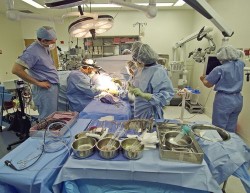Top Class Actions’s website and social media posts use affiliate links. If you make a purchase using such links, we may receive a commission, but it will not result in any additional charges to you. Please review our Affiliate Link Disclosure for more information.

However a number of women are now concerned over whether or not a power morcellator used for hysterectomy significantly increases their chances for uterine cancer or not.
Power morcellators used for hysterectomy is a very common use for this device, as it does have the ideal set of tools in place for a minimally invasive procedure.
Oftentimes women can ask for the power morcellator before the procedure, or can ask the surgeon if traditional means or a power morcellator used for hysterectomy was implemented during the procedure.
If the patient is unsure if a power morcellator was used or not, a tell tale sign of its use is minimal scarring and very quick recovery time compared to traditional surgery.
But another possible sign associated with power morcellator surgery is being diagnosed with aggressive uterine cancer soon after the surgery.
Complications With Morcellator Used for Hysterectomy
Power morcellators are popularly used for a number of personal procedures for women including myomectomies and hysterectomies, but women had been reportedly developing uterine cancer at an aggressive rate soon after undergoing the procedures using the devices.
Power morcellators are a relatively new medical innovation, not becoming commonplace until the 2000s when patients and doctors noted they could be used to efficiently remove uterine fibroids.
These surgical tools consist of two rotating blades designed to slice muscle into manageable sizes, which can be sucked out through a tube inserted through the abdomen. Not only is this less invasive than traditional surgery, it also allows for quicker recovery time for women.
However when the rotating blades cut up unknown cancerous fibroids, previously dormant cancer cells are then released into the body. This allows the disease to progress at a much faster rate.
At this point in time, there is no diagnostic method available to determine if a woman has uterine cancer before undergoing the procedure.
The FDA estimates that one in 350 women have early stage uterine cancer, with an estimated 50,000 women opting for power morcellator surgeries per year.
With this in mind, the agency sent out a public warning on April 17, 2014, discouraging women from choosing power morcellator use in hysterectomy and other laparoscopic procedures.
Even before the FDA sent out this warning, however, women and medical professionals stated they were not sufficiently warned against the complications associated with the device.
Furthermore, some medical experts speculated whether or not power morcellators were sufficiently tested before being released to market.
This has led to a number of women opting to take legal action against the manufacturing companies of these devices, for failing to warn of the risk of uterine cancer.
Potential claimants should contact a specialized lawyer to determine if they are eligible for a power morcellator lawsuit.
Do YOU have a legal claim? Fill out the form on this page now for a free, immediate, and confidential case evaluation. The morcellation cancer attorneys who work with Top Class Actions will contact you if you qualify to let you know if an individual lawsuit or class action lawsuit is best for you. [In general, morcellator cancer lawsuits are filed individually by each plaintiff and are not class actions.] Hurry — statutes of limitations may apply.
ATTORNEY ADVERTISING
Top Class Actions is a Proud Member of the American Bar Association
LEGAL INFORMATION IS NOT LEGAL ADVICE
Top Class Actions Legal Statement
©2008 – 2024 Top Class Actions® LLC
Various Trademarks held by their respective owners
This website is not intended for viewing or usage by European Union citizens.
Get Help – It’s Free
Join a Free Morcellation Cancer Class Action Lawsuit Investigation
If you or a loved one were diagnosed with cancer in the uterus, pelvis or abdomen within two years of undergoing surgery for a myomectomy (removal of fibroids), hysterectomy (removal of the uterus), oophorectomy (removal of the ovaries), or salpingectomy (removal of fallopian tubes), you may have a legal claim. See if you qualify by filling out the short form below.
An attorney will contact you if you qualify to discuss the details of your potential case at no charge to you.
Please Note: If you want to participate in this investigation, it is imperative that you reply to the law firm if they call or email you. Failing to do so may result in you not getting signed up as a client, if you qualify, or getting you dropped as a client.
Oops! We could not locate your form.












